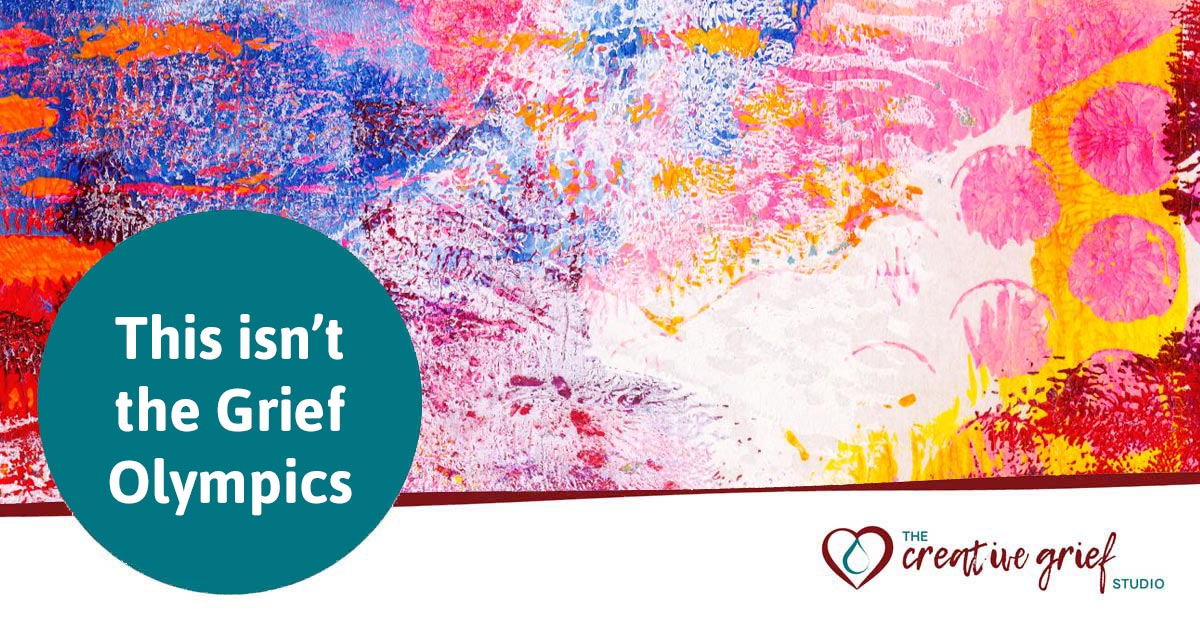We’ve all come across the “Grief Olympics” at some point in our personal or professional experiences of grief support. The grief olympics is based in a myth we here at The Creative Grief Studio call “the Hierarchy of Loss.” The Hierarchy of Loss involves societal and cultural ratings and comparisons of different kinds of losses. The losses that are considered “bigger” or “worse” are usually well-validated by society and people grieving those losses receive support and lots of permission to grieve. On the other hand, some kinds of losses are either ranked “small” or “not as bad as” or perhaps not even recognised as a loss that’s significant enough to cause grieving. These losses typically receive very little (if any) social validation, and the grievers are often granted very little support or permission to grieve. They may even be shamed about their grief response.
Hierarchy of Loss as myth
We call the Hierarchy of Loss a myth because, despite its prevalence in our society’s ways of thinking and talking about grief, the Hierarchy of Loss has no research support. The Hierarchy of Loss is a subjective ranking that’s made up and, even though there’s often some widespread social agreement about how different losses should be ranked, there’s no objectively “correct” or “accurate” ranking of losses. Because our experiences of even the same kinds of losses can be so diverse.
One of the ways we see this Hierarchy of Loss myth bringing shame and disconnection into the grief experience is in grief support groups. People sometimes don’t take up the opportunity to attend grief support groups, because they don’t know who else will attend and they fear that their loss “isn’t as big other other people’s losses will be.” Or they go to the first few sessions and hear other people’s stories and fear that other people might think they’re being indulgent for struggling so much with their loss, which they’ve deemed to be “not as bad as the other group member’s losses.” Sadly, the Hierarchy of Loss myth is so prevalent that we’ve come across people who’ve even had other grief support group members or the group facilitator say to them that certain kinds of losses are worse than others!
Taking a stand
Given the prevalence and damaging effects of the Hierarchy of Loss myth, as Creative Grief Support Practitioners, we need to make sure that we are not talking about grief in ways that perpetuate the Hierarchy of Loss. To do that, we need to examine and deconstruct our own rankings of different kinds of losses. We need to also educate our clients to stand together against the comparisons and shaming and disconnection that the hierarchy of loss engenders.
If we stand against the Hierarchy of Loss myth and instead we approach grief experiences with the idea that:
- we can identify there is pain here and
- we may know pain from our own experiences, but
- we don’t know what the person having the current grief experience is feeling, *then* we can get curious, be present, ask questions about what is happening so we *learn* from them.
And most importantly by taking this approach, we can support them. To be fully present for ourselves and for the pain others encounter, it is important to pay attention to the idea that all pain is relative. Whatever the worst grief is that someone has experienced *is* the worst grief they’ve experienced.
Generative questions to explore Hierarchy of Loss
- So what does your Hierarchy of Loss look like?
- How did you come to rank those losses that way?
- Who or what might help you to notice how differently another person might rank different kinds of losses?
- How do you get curious when you encounter a client with a new kind of loss that you’ve never considered, or a different kind of grief experience or a loss that you’ve experienced?
- What questions can you ask to come to understand their experiences of their loss and grieving?
- How can you introduce your clients to an awareness of the damaging effects of the hierarchy of loss?
- Think about how you facilitate grief support groups. How might the structure of the group or facilitation style either perpetuate or breakdown the myth of the Hierarchy of Loss?

